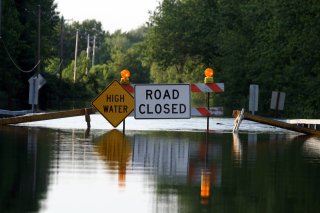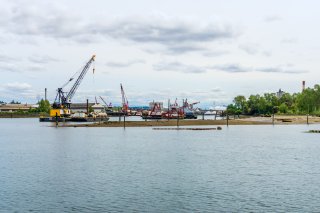Cumulative Health Impacts at the Intersection of Climate Change, Environmental Justice, and Vulnerable Populations/Lifestages: Community-Based Research for Solutions Grants

The environmental and health impacts of climate change are far reaching. Some communities are more vulnerable to these challenges because they are faced with greater exposure to pollutants and lack the resources to respond to and cope with these environmental stressors. This inequality can lead to communities being more likely to suffer sustained and even permanent damage from the impacts of climate change without hope of recovery, further worsening these health disparities. Additionally, children, older adults, and people with disabilities or pre-existing health conditions may be more susceptible to the environmental and health impacts of climate change.
EPA awarded $21,410,211 in total research grant funding to 16 institutions for community-based research to investigate how climate change may compound potentially adverse environmental conditions and stressors in underserved communities.
Accurate and comprehensive understanding of the cumulative health impacts from climate change related stressors compounded upon other chemical and non-chemical environmental stressors in underserved communities are needed to identify and implement appropriate measures for reduction, adaptation, and prevention. These grants will support research projects that will use community-based participatory research approaches that aim to empower the partnering underserved communities with science-based resilience-building solutions to protect their most vulnerable residents.
To learn more, visit the RFA webpage.
Research Grant Recipients on this page:
- Boston University, Boston, Mass.
- City University of New York - York College, Jamaica, New York
- Drexel University, Philadelphia, Pa.
- Emory University, Atlanta, Ga.
- Iowa State University, Ames, Iowa
- Medical College of Wisconsin, Milwaukee, Wisc.
- Ohio State University, Columbus, Ohio
- Physicians Scientists and Engineers for Sustainable and Healthy Energy, Oakland, Calif.
- Puerto Rico Science, Technology and Research Trust, San Juan, Puerto Rico
- RAND Corp, Pittsburgh, Pa.
- Stanford University, Stanford, Calif.
- University of Alaska - Anchorage, Anchorage, Alaska
- University of California, Davis, Davis, Calif.
- University of California – San Francisco, San Francisco, Calif.
- University of Maryland – College Park, College Park, Md.
- University of Washington, Seattle, Wash.,
Boston University, Boston, Mass.

Project Title: Advancing Community Resilience to Cumulative Climate Impacts in the Mystic River Watershed (ACRES)
Principal Investigator: Jonathan Levy
Award Amount: $1,349,151
The goal of the project is to build community-level resilience against increased air and water pollution due to climate changes in underserved communities in the Mystic River watershed. The project team will engage a variety of stakeholders in ongoing discussions of priority concerns and proposed climate resilience solutions, and it will combine stakeholder knowledge with geolocated data to inform communities of climate and chemical hazards and the health benefits of solutions. The project team will use a novel multi-stressor health impact assessment (HIA) framework. The researchers will encode community insights into a high-resolution geospatial database characterizing chemical exposures, vulnerability, and geographic / sociodemographic co-occurrence of hazards. Then the project team will develop impact models to highlight locations prone to cumulative climate risks and chemical exposures. Researchers will also use multi-stressor epidemiological analyses to evaluate conjoint or cascading hazards to vulnerable people and neighborhoods. The scientific findings of this project may be used to inform policies and investments to protect people’s health.
View the research abstract from Boston University.
City University of New York - York College, Jamaica, New York
Project Title: Studying Air Pollution-Health-Climate Interactions for People of Color in Southeast Queens, NY: A Community-Based Project
Principal Investigator: Dawn Roberts-Semple
Award Amount: $1,344,622
With this project, researchers will engage southeast Queens residents in the measurements of key air pollutants through community-based participatory research, increasing their understanding of climatic factors and air pollution impacts on health, and empowering them to use such knowledge to inform policy on alleviating climate impacts and sustaining good health. The specific objectives are: to demonstrate the impact of pollutant emissions from waste stations on air quality in Southeast Queens through research field measurements; to train the residents to develop community science strategies such as crowdsourcing tools with the new knowledge gained from the measurements, enabling the residents facing environmental injustice to mobilize new innovative, low-cost, replicable strategies leading to the development of policy recommendations for better management of waste transfer stations; and to translate the research data and community input into climate and policy solutions for traffic emission reduction and relief from the current health burden, improving quality of life. This project will yield critical data and scientific evidence to address urgent issues associated with underserved communities in understanding how climate change, air pollution, environmental justice, and public health intersect.
View the research abstract from CUNY - York College.
Drexel University, Philadelphia, Pa.
Project Title: Understanding Pediatric Susceptibility Across Temperature and Environment in New York = UPStATE NY
Principal Investigator: Jane Clougherty
Award Amount: $1,350,000
The overarching objective of this research project is to identify community stressors and resilience-enhancing assets that shape relationships between climate change-related exposures [heat, ozone, and fine particulate matter (PM2.5)] and children’s health. The project team is particularly interested in assets which may bolster children’s resilience to climate-related exposures in underserved communities across the state of New York. By collaborating with the state government, the Pediatric Environmental Health Specialty Units, and the only-in-the-nation statewide Children’s Environmental Health Centers Network, researchers will generate daily fine-scale exposure-health relationships for heat, ozone, and PM2.5 on all children between the ages of 0 and 17 years during the years of 2005 through 2019. The project team will then cross-examine stressors identified by the New York State Climate Justice Working Group and apply the Resilience Activation Framework, which organizes assets in five domains (human, economic, social, political, environmental capital). The investigation will result in the identification of key community stressors and assets shown to exacerbate or buffer impacts of climate-driven exposures on children’s health.
View the research abstract from Drexel University.
Emory University, Atlanta, Ga.
Project Title: Building Resilience in Atlanta: Leveraging Community Knowledge to Understand and Map the health impacts of cumulative environmental exposures and social vulnerability in the context of climate change
Principal Investigator: Saria Hassan
Award Amount: $1,349,998
The goal of this project is to understand how the cumulative health impact of chemical and non-chemical exposures is exacerbated by climate change among the most vulnerable communities in Atlanta. The project aims to achieve this goal through:
- creating an index and map at the neighborhood level focused on the cumulative chemical and non-chemical exposure of individuals in Atlanta and how their health effects are exacerbated by climate change,
- understanding how highly susceptible individuals with chronic disease perceive and manage the effects of chemical, non-chemical, and climate-related factors on their mental health, asthma, and obesity-sensitive conditions, and
- facilitating community-based and community-led education initiatives to empower the community and increase resilience against climate change and its effects on health.
Researchers will create a new index that would allow researchers to better understand how climate change can exacerbate cumulative health impacts from chemical and nonchemical exposures. The project team also plans to generate causal loop diagrams that depict how these factors interact to influence health outcomes of priority to the community. Researchers will create educational information that explain these cumulative health impacts, the effect of climate change, and the increased vulnerability of those with chronic illness. The project team aims to produce a policy report for the community that outlines proposed solutions to address these cumulative health impacts.
View the research abstract from Emory University.
Iowa State University, Ames, Iowa
Project Title: Building Adaptive Capacity to Climate Change in Alaska Native Communities by Reducing Health Risks from Water Infrastructure, Quality, and Security
Principal Investigator: Cristina Poleacovschi
Award Amount: $1,350,000
This project aims to assess the relationships between climate-induced concerns related to water infrastructure and their effects on health in Alaska Native communities. The project aims to:
- identify the effects of climate change on water infrastructure, quality and insecurity,
- identify the cumulative effects of water quality, water insecurity and local vulnerabilities on health, and
- build adaptive capacity to climate change through community-based adaptation.
The project team will conduct community-based monitoring and direct sampling to assess water quality and gather surveys and interviews of community members to capture water insecurity and local vulnerabilities. They will also assess the cumulative effects of water quality, water insecurity, and local vulnerabilities on health, mental health and a non-Western perspective of health and build quantitative tools to model the water infrastructure and conduct data-driven and model-based approaches for detecting and localizing the leaks. Results of this project will include hydraulic models of the water distribution system and open-source, data-driven algorithms and codes for leak detection and localization; mapped areas of the most vulnerable households at risk of water quality and insecurity; and comprehensive models displaying significant factors that influence and determining health, mental health, and non-Western health outcomes. These results will inform a list of practical interventions and preventive measures for improving health of Alaska Native communities.
View the research abstract from Iowa State University.
Medical College of Wisconsin, Milwaukee, Wisc.

Project Title: Leveraging a public school district and schoolyard spaces to confront climate health inequities in a low-income, urban community of color
Principal Investigator: Kirsten Beyer
Award Amount: $1,349,999
The goal of this research is to leverage the Milwaukee Public Schools district facilities to generate scientific and community knowledge to build community resilience and reduce climate health inequities in Milwaukee and beyond. The project team will engage public school students, staff and families in a climate change and health curriculum and dialogue focused on the health impacts of global climate change, including in Milwaukee, and share information on how they can support implementation of the Milwaukee Climate and Equity Plan to safeguard community health. The research team will also quantify the impact of public schoolyard greening as an effective community-based solution to mitigate climate impacts on heat exposure, air pollution, educational engagement and achievement, and mental/emotional health and well-being. The project team will measure key climate health related metrics prior to and following schoolyard greening at eight public schools to confirm if green space can be an effective tool to reduce environmental health inequities.
View the research abstract from the Medical College of Wisconsin.
Ohio State University, Columbus, Ohio
Project Title: Analysis of Climate Change Related Chemical and Non-Chemical Stressor Exposures: Cumulative Health Impacts and Risk Trajectories in Vulnerable Ohio Census Tracts
Principal Investigator: Darryl Brice Hood
Award Amount: $1,294,249
The overarching aim of this research is to analyze and model the impact of climate change related chemical and non-chemical stressors on personal health outcomes of residents living in underserved communities. The project team will compare the array of available data in broad categories of chemical and non-chemical stressor exposures, and four sources of health data will be cross-examined to places of residence in low-income, underserved, and high-income community cohorts for the years 2014-2020. The health outcomes investigated will include mental health, substance abuse, outpatient dialysis, stroke, respiratory disease, heart disease, diabetes, obesity, hypertension, cancer, kidney disease, osteoporosis, and adverse pregnancy outcomes. The results of this research will reveal important information regarding whether residents exhibit differential risk trajectories for disparate health and policy outcomes at the population-level in response to climate change related chemical and nonchemical stressor exposures from the built, natural, physical, and social environment.
View the research abstract from Ohio State University.
Physicians Scientists and Engineers for Sustainable and Healthy Energy, Oakland, Calif.
Project Title: Contra Costa Climate Air Pollution, and Pregnancy Study (CC CAPS)
Principal Investigator: Elena Krieger
Award Amount: $1,350,000
The proposed research project will use an existing air monitoring network in Richmond, California, and aggregate data from other networks across Contra Costa County to characterize local disparities in exposure to air pollution, heat, and humidity, and the impact of wildfires on exacerbating these disparities. The project team will assess relationships between exposure and perinatal outcomes and model community-driven interventions and policies to reduce exposures and health impacts. Researchers will establish a stakeholder advisory committee of representatives from local agencies, non-profit organizations, and the community, which will help guide the scope and direction of the overall project. The project team aims to demonstrate the utility of continuous monitoring of air pollution, temperature, and humidity to identify community hotspots of exposure, understand relationships with health, and highlight ongoing environmental justice concerns in Contra Costa County. The goal is to identify the most susceptible, vulnerable, and underserved communities through continual measurement of environmental stressors related to air quality, and to then empower them with science-based mitigative tools.
Puerto Rico Science, Technology and Research Trust, San Juan, Puerto Rico
Project Title: Community-based research to address cumulative health effects of drought on rural communities who operate drinking water aqueducts in Puerto Rico
Principal Investigator: Leslie Maas Cortes
Award Amount: $1,349,990
The goal of this research is to use climate change information with participatory science data and community engagement observations to understand and predict the impact of global climate change on freshwater quantity and quality for small potable water supply systems of remote populations in Puerto Rico. An understanding of the impact of climate change on pathogen survival and exposure pathways will assist local capacity building efforts to design climate resilient water distribution systems and provide recommendations to minimize pathogen exposure. Meteorological observations will establish climate relationships important to pathogen exposure and provide information to understand high resolution climate change projections for microclimates. Researchers will engage the community, conduct interviews and collect data on rainfall, water quality, and surveillance of waterborne pathogens. Researchers hope to build capacity via engagement with stakeholders and develop water quality and quantity risk assessments as well as community-led solutions to improve human health and compliance with EPA standards.
View the research abstract from the Puerto Rico Science, Technology and Research Trust.
RAND Corp, Pittsburgh, Pa.

Project Title: Health and High Water: Health Impacts of Increased Rainfall on Families Living in Racially Isolated Neighborhoods in Pittsburgh PA
Principal Investigator: Tamara Dubowitz
Award Amount: $1,349,997
This project builds on a unique community-partnered research infrastructure that has been following a cohort of households, and their built and social environment, within an underserved urban and predominantly black community in Pittsburgh, PA, for the past decade. Black communities are often disproportionately affected by cumulative and compounded health, social, economic, and environmental impacts of climate change, fueled in part by redlining and other policies that have created differences in access to opportunity and resources. In this project, the research team will characterize the bacterial and fungal pathogens and indoor air quality (e.g., radon concentrations, humidity) in residential basements in two predominantly black, low income, urban neighborhoods in Pittsburgh. They will also characterize respiratory and behavioral health conditions of residents exposed to the microbial pathogens and examine associations between basement pathogens and contaminants, basement moisture, daily rainfall extremes, housing and neighborhood conditions, and cumulative health impacts for residents across the lifespan. Finally, researchers will develop and disseminate community-based solutions to address cumulative health impacts of pathogen/contaminant exposure related to wet basements and heavy rainfall events. The work will improve understanding of—and generate community-based solutions for—the cumulative health impacts of increased rainfall among residents in predominantly black, low-income neighborhoods.
View the research abstract from RAND Corp.
Stanford University, Stanford, Calif.
Project Title: Advancing sanitation justice: Linking climate-exacerbated nitrogen, cyanotoxins, and parasites with reimagined sanitation infrastructure and services in African American communities
Principal Investigator: William Abraham Tarpeh
Award Amount: $1,350,000
Although access to sanitation infrastructure in the U.S. is widespread, it is still not equitable, particularly for underserved African American communities. To meet the urgent needs of these communities, the project team plans to pursue three objectives:
- comparing sanitation-related exposure to environmental contaminants for an urban and rural community,
- prioritizing effects of climate change stressors on sanitation infrastructure and contaminant health impacts, and
- designing and evaluating improved sanitation infrastructure to reduce exposure while maximizing economic viability and community engagement.
The research team aims to achieve these objectives through collaborations with community organizations and longstanding relationships with residents in two predominantly black communities: urban Mount Vernon, New York, and rural Lowndes County, Alabama. Outcomes of this work will include enhanced community agency via improved risk assessment for underserved populations relative to sanitation infrastructure; enhanced adaptive capacity by prioritizing similar communities and informing planning efforts; and enhanced sanitation access via community and economic assessment of promising systems.
View the research abstract from Stanford University.
University of Alaska - Anchorage, Anchorage, Alaska

Project Title: Filling data gaps: Development of a community-centered tool for assessing health impacts of intersecting climate hazards, wildfire smoke exposure, and social disparities in rural tribal and aging communities in Alaska
Principal Investigator: Micah Hahn
Award Amount: $1,324,131
Increasing exposure to wildfire smoke is a major issue in Alaska, alongside intersecting climate related hazards such as the impacts of warming winter weather on transportation safety, ecological changes driving unpredictable fisheries, and coastal erosion affecting community infrastructure. The research team will use a purposeful, co-development process that engages academic researchers, state, tribal, wildfire management, public health entities, and community partners to envision, develop, and test locally relevant and practical tools that will enable access to state of-the art climate and environmental data and modeled projections and information on health and social vulnerability in a useful and understandable way. Communities will be able to assess compounding climate hazards and social vulnerabilities, prioritize climate-related health impacts and vulnerable demographic groups, design effective interventions, and apply for climate resilience funding. The expected outcomes include a statewide, community-driven, spatially explicit, web-based tool in Alaska to assess the cumulative health impacts of climate change; an assessment of major contributing factors to vulnerability to wildfire smoke exposure from the perspective of tribal, public health, and wildfire management stakeholders; and scenarios to showcase examples of community-driven approaches.
View the research abstract from the University of Alaska, Anchorage.
University of California, Davis, Davis, Calif.
Project Title: Early Life Vulnerability to Climate-driven Wildfire Events on Pregnancy and Child Developmental Health Outcomes in Underserved Populations
Principal Investigator: Rebecca J. Schmidt
Award Amount: $1,349,979
This project aims to identify which populations are most impacted by wildfire associated air pollution exposures, and whether these exposures increase risk for adverse birth and child neurodevelopmental outcomes. The research team will determine critical periods of developmental susceptibility and vulnerability factors that compound risk, to identify who would benefit most from education and resources for exposure mitigation. Partnership with community members will inform culturally relevant research questions, aid with the interpretation and dissemination of results, and guide education efforts and interventions to help mitigate wildfire smoke exposure. Researchers will examine perinatal wildfire exposures in association with birth outcomes, including gestational age and weight at birth, as well as any associations with diagnoses of autism and developmental delays. The project team will also train members of vulnerable communities to lead educational activities on building low-cost and effective air filtration system and other ways to mitigate harmful exposures.
View the research abstract from the University of California, Davis.
University of California – San Francisco, San Francisco, Calif.
Project Title: Partnering for Resilient Opportunities to Eliminate Cumulative Toxic (PROTECT) Health Effects from Wildfire PM2.5 in Environmental Justice Communities
Principal Investigator: Neeta Thakur
Award Amount: $1,330,536
This project aims to address the critical need to understand the impact of recurrent and prolonged wildfire smoke exposure on health and how this health risk is distributed across underserved communities. Researchers will use a combination of air infiltration models using housing attributes and meteorological data as inputs combined with new observational studies of infiltration factors of PM2.5 to estimate smoke infiltration. The project team will investigate the health effects of wildfire-specific PM2.5 on respiratory, cardiovascular, and cerebrovascular-related emergency department visits and hospitalizations across zip codes in California, factoring for smoke infiltration. Researchers will also examine if health effects occur disproportionately across social vulnerability factors, including age, race/ethnicity, composite indices for socioeconomic status, and underserved community designation using CalEnvironScreen 4.0. Lastly, with the community partners, researchers will survey residents of underserved communities residing in Fresno, Richmond, and San Francisco about mitigation behaviors during wildfire events. Together, these data will be used to codevelop implementation strategies to increase uptake of acceptable community-relevant mitigation interventions.
View the research abstract from the University of California, San Francisco.
University of Maryland – College Park, College Park, Md.
Project Title: Septic to Sewer? Justice-focused strategies for addressing coastal septic failures under sea-level rise and increased flooding
Principal Investigator: Allison Reilly
Award Amount: $1,350,000
This research project is an interdisciplinary, multi-scale investigation of the impacts of increased flooding and sea-level rise on septic systems failure, both mechanistically and in terms of degraded nutrient and pathogen removal in rural communities, leading to more gastrointestinal illness and parasitic infections. Researchers state that this concern is acutely more problematic in areas with higher proportions of people of color who are more likely to reside on flood-prone land and historically have been less likely to be connected to municipal sewer systems. With a geographic focus on the Eastern Shore of Maryland, the proposed research plans to thoroughly examine which populations are acutely at risk of septic system failures now and in the future, while addressing the antecedent conditions (including historical settlement patterns and exclusion from municipal sewers), that potentially exacerbate this exposure. This will be done by collecting primary data on septic health and by leveraging a myriad of secondary data to develop a composite risk. Ultimately, by using empirical data and community input, the project will evaluate where and how specific policy and technology solutions can address the compounded risk, while ensuring the benefits accrue in a way that addresses past discriminatory practices.
View the research abstract from the University of Maryland.
University of Washington, Seattle, Wash.

Project Title: The Duwamish Valley Research Coordination Network: Building Capacity for Tribal, Community, and Agency Research in Urban Watersheds
Principal Investigator: Melanie Malone
Award Amount: $1,267,559
The goal of this community-engaged project is to build community capacity against contaminants in Duwamish Valley by collaborating with underserved communities to strengthen communities’ water, soil and sediment testing programs. The project aims to facilitate decision-making for targeting future cleanup and community visioning for storm water management in the face of frequent flooding due to climate change. The project plans to equip the underserved tribal and other communities with the necessary resources for testing and clean-up process that would support communities’ urgent needs. The project aims to achieve this goal by working closely with the communities thorough surveys, interviews and sharing of environmental data. The project will monitor soil, water and sediment contaminants (PAH, PCB, metals, dioxin/furans) throughout the Duwamish River Watershed during storm water surges to identify high-risk areas. With this information, the project plans to provide a useful guidance to community leaders for effectively cleaning up the contaminants. Lastly, the project plans to co-develop viable community-based solutions to build resilience against migrations of contaminants due to climate change.
View the research abstract from the University of Washington, Seattle.
